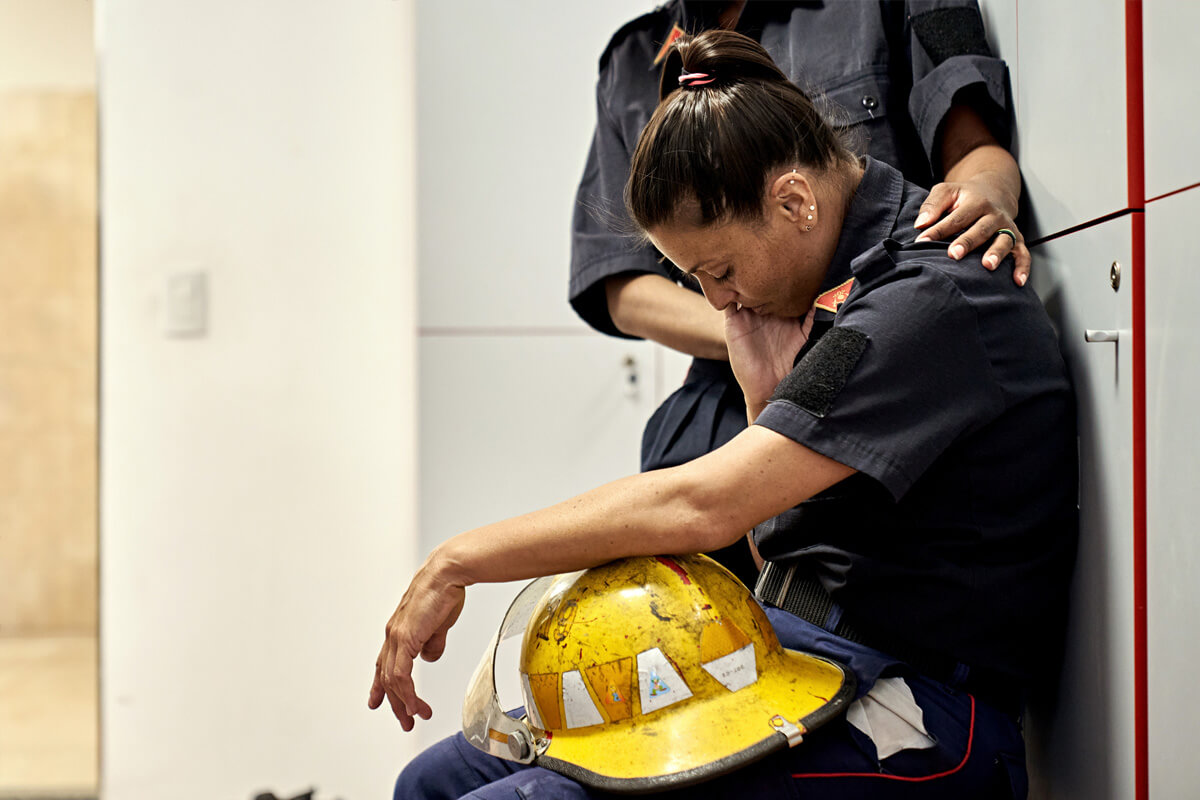Understanding the Emotional Weight of First Responders: Pathways to Support and Healing
Every day, first responders—firefighters, police officers, EMTs, and other emergency personnel—face situations most people would rather avoid. From life-threatening rescues to harrowing accidents, these dedicated professionals step up to protect and serve. But with each call, each incident, they add to a weight that doesn’t simply disappear when the shift ends. At Guiding Light Behavioral Health in Maine, we’re here to support first responders in carrying that weight, offering specialized mental health care for those facing life’s toughest moments. [ institute of health ]
The Hidden Emotional Cost of Being a First Responder
For many, the badge is more than a symbol of duty; it’s a commitment to facing crises and trauma that leave deep, often invisible, emotional impacts. Firefighters, EMTs, and police officers routinely witness severe accidents, manage emergencies, and endure high-stress situations that most people can’t imagine. Beyond the physical risks, however, lies a hidden toll—the emotional strain and mental fatigue that build up over years of service.
This stress can manifest in different ways. Some first responders experience post-traumatic stress disorder (PTSD), enduring flashbacks, nightmares, and persistent anxiety. Others may face a quieter but equally heavy burden known as Emergency Responder Exhaustion Syndrome, a condition that builds up from constant exposure to smaller, repeated traumas, eventually leading to burnout, depression, or chronic stress. At Guiding Light, we offer specialized services to address these challenges, from trauma-focused counseling to resilience-building programs designed specifically for first responders.
A Personal Insight: Sarah’s Experience
Guiding Light Behavioral Health is led by Sarah Mildrum, Maine’s first Emergency Responder and Public Safety Certified Clinician (ERPSCC) and a Licensed Clinical Social Worker. But Sarah’s connection to first responders goes beyond her credentials. As the wife of a firefighter, Sarah understands firsthand the emotional highs and lows that emergency responders and their families experience. She’s seen the quiet decompression after a tough call, the toll of unpredictable hours, and the strain on relationships that comes with the job.
Sarah’s experience as both a clinician and a family member of a first responder has shaped her approach to mental health care at Guiding Light. Her expertise in treating PTSD and other trauma-related conditions is grounded in a real understanding of their world. Sarah’s goal is simple but profound: to help first responders regain mental wellness and build resilience so they can continue serving their communities with strength.
The Ripple Effect: Impact on Families of First Responders
The weight of service extends beyond the first responder; it often affects the whole family. Spouses, children, and loved ones of firefighters, police officers, and EMTs live with the stress that follows each shift. They’re the ones who support their partners after difficult days, providing comfort and understanding during the quiet moments when memories resurface. [ afteraction.care ]
Guiding Light Behavioral Health provides not only therapy for first responders but also support programs designed for families. These family therapy services help loved ones understand the unique pressures that come with a career in emergency services and offer coping tools to build resilience together. By strengthening family bonds and fostering open communication, Guiding Light creates a supportive environment at home, where everyone can face the emotional challenges of a first responder’s life together.
Therapy Options for First Responders at Guiding Light Behavioral Health
Every first responder has a unique experience, facing different challenges and carrying individual burdens. That’s why Guiding Light offers a range of trauma-focused therapies specifically geared towards the mental health needs of firefighters, police officers, EMTs, and other emergency personnel.
Cognitive Behavioral Therapy (CBT) for First Responders
Cognitive Behavioral Therapy (CBT) is one of the foundational treatments offered at Guiding Light. This therapy helps first responders reshape the negative thought patterns that often result from trauma. In a line of work where high-stress situations are routine, CBT provides a practical way to handle the emotional aftermath. By focusing on adjusting responses to trauma, CBT allows first responders to manage stress more effectively, improving both their mental resilience and their personal relationships. [ rockrecoverycenter.com ]
CBT is particularly valuable for those experiencing anxiety, depression, or PTSD. At Guiding Light, our goal is to empower emergency personnel to regain control over their emotional responses, enabling them to move forward with renewed strength and adaptability.
Do you feel like you would benefit from talking to someone about help, your options, or just need some advice? Reach out and schedule your consultation today.
Brainspotting Therapy for Trauma Relief
For those who feel trapped by traumatic memories, Brainspotting Therapy offers a path to deep healing. This technique, led by Brainspotting-trained therapist Maria Moustrouphis at Guiding Light, uses eye movement to identify specific “brainspots” associated with traumatic memories. By focusing on these points, Brainspotting allows individuals to access and process deeply held pain, helping to reduce symptoms of PTSD, anxiety, and depression.
Brainspotting is especially beneficial for first responders dealing with complex trauma, where distressing memories create mental and emotional barriers. This therapy enables emergency personnel to safely explore their trauma, allowing them to heal from within and move beyond limitations imposed by their past experiences. [ first responders foundation ]
Outdoor Recreational Programming for PTSD Recovery
Healing doesn’t always have to take place within four walls. At Guiding Light, we’ve seen the powerful impact nature can have on mental wellness, especially for those working in high-stress environments. Our Outdoor Recreational Programming offers first responders the chance to engage in outdoor activities—whether it’s hiking, kayaking, or a meditative walk—designed to relieve stress and promote mindfulness.
These nature-based therapy programs offer a welcome escape from the daily pressures of emergency work, allowing first responders to reconnect with themselves and find a sense of peace. With Maine’s beautiful landscapes as a backdrop, outdoor therapy provides both physical benefits and a mental reset, giving participants a rejuvenating break from their routine.
Peer Support and Group Therapy
Sometimes, the best support comes from others who truly understand what you’re going through. Guiding Light’s Peer Support and Group Therapy sessions offer a safe space for first responders to share their experiences, struggles, and triumphs with peers who “get it.” In these groups, participants find camaraderie and reassurance, knowing they’re not alone in their journey. [ Psychiatrist Times ]
Group therapy provides more than just conversation; it’s a source of strength and solidarity. Many first responders discover valuable coping strategies and a renewed sense of resilience through these peer connections. At Guiding Light, our goal is to build a community where first responders can lean on one another, gaining support from those who know the challenges firsthand.
Compassion at Every Step
Reaching out for help is a big step, especially for those who are used to being the strong ones in every situation. At Guiding Light Behavioral Health, we know how difficult it can be to seek support. That’s why empathy is at the heart of everything we do. Sarah Mildrum and our team of licensed therapists provide an environment of respect, understanding, and compassion, ensuring that each first responder feels safe to open up and explore their challenges.
Our approach is rooted in the belief that mental health care is essential, not optional. At Guiding Light, we’re here to help first responders carry the emotional weight they bear, offering a supportive space where they can unpack their struggles without fear of judgment.
FAQs for First Responders Seeking Mental Health Support
What types of trauma therapy are available for first responders?
Guiding Light offers therapies like Cognitive Behavioral Therapy (CBT), Brainspotting, and outdoor recreational programs designed specifically for emergency personnel dealing with trauma.
How can Brainspotting therapy help firefighters with PTSD?
Brainspotting is a powerful tool for targeting and processing deeply stored traumatic memories. It uses specific eye movements to help individuals access and relieve the intense emotions tied to PTSD.
Why is mental health support important for police officers and EMTs?
First responders face unique stressors that can impact their mental and emotional health. Support from experienced therapists helps them manage trauma and stress, enabling them to continue their crucial work effectively.
Taking Care of Your Mental Health as a First Responder
To first responders dedicated to protecting others, remember: your mental well-being is as vital as the service you provide. Caring for yourself isn’t just beneficial for you; it’s essential for those who depend on you, from community members to your own family. Think of it as the mental “gear” you need before you face a new day of challenges.
Guiding Light Behavioral Health is here to support that journey. Our Maine-based services are crafted with first responders in mind, offering therapies tailored to meet the unique challenges of emergency personnel. Our goal is to empower you with the resilience and mental wellness needed to continue your work effectively and sustainably.
Finding Light at Guiding Light Behavioral Health
As each day ends, first responders often return to families, homes, and a rare moment of quiet. But for many, the weight of the day’s events lingers. At Guiding Light Behavioral Health, we understand this all too well. Our mission is to provide a space where first responders can find comfort, understanding, and healing.
Whether through one-on-one therapy, family support, or outdoor activities, Guiding Light is here to stand by those who stand by all of us. For the protectors, the responders, and the brave, know that you are never alone in your journey. Let us support you, as you continue to serve your community.
Need Help? Book A Free Call Here
Read More About Trauma Therapy
- Guiding Light Behavioral Health: Compassionate Mental Health Support for First Responders
https://guidinglightbehavioralhealth.com/ - First Responder Therapy FAQ: Your Questions Answered About Mental Health Support at Guiding Light
https://guidinglightbehavioralhealth.com/guiding-light-first-responder-therapy-faq/ - Trauma Therapy for First Responders: Specialized Support at Guiding Light Behavioral Health
https://guidinglightbehavioralhealth.com/trauma-therapy-first-responders/





